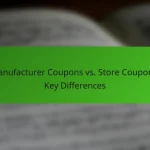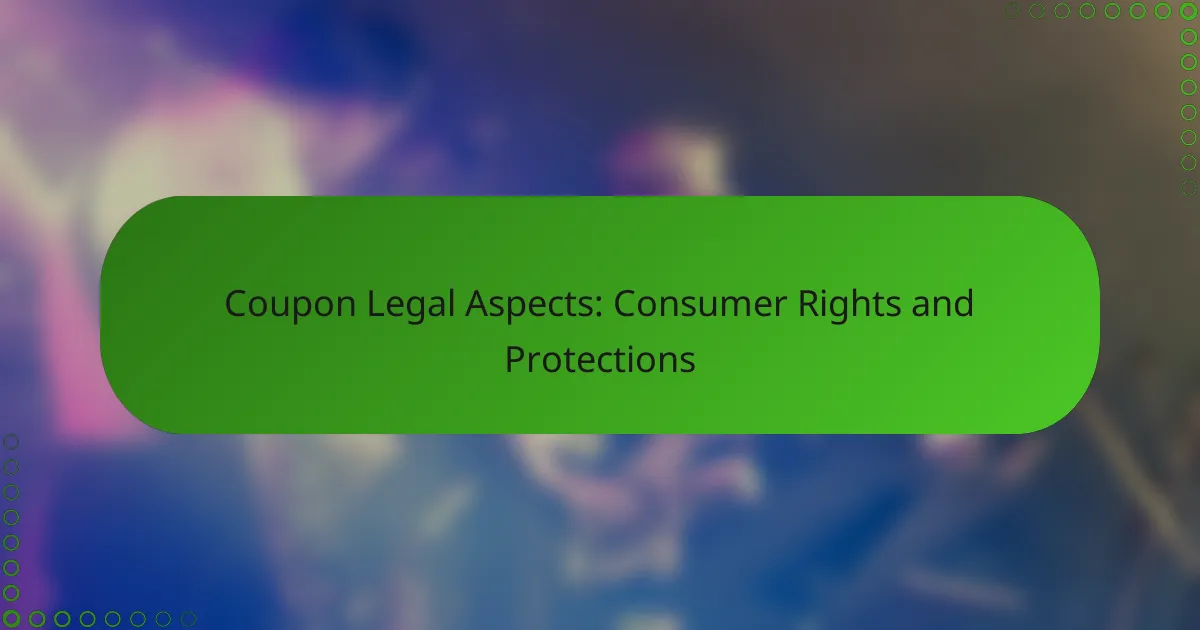Understanding the legal aspects of coupons is essential for consumers to navigate their rights and protections effectively. In the United States, consumers are entitled to accurate information and the ability to redeem coupons, while also being safeguarded against misleading practices. Awareness of coupon expiration dates and the implications of deceptive advertising can empower consumers to make informed choices and avoid potential pitfalls.
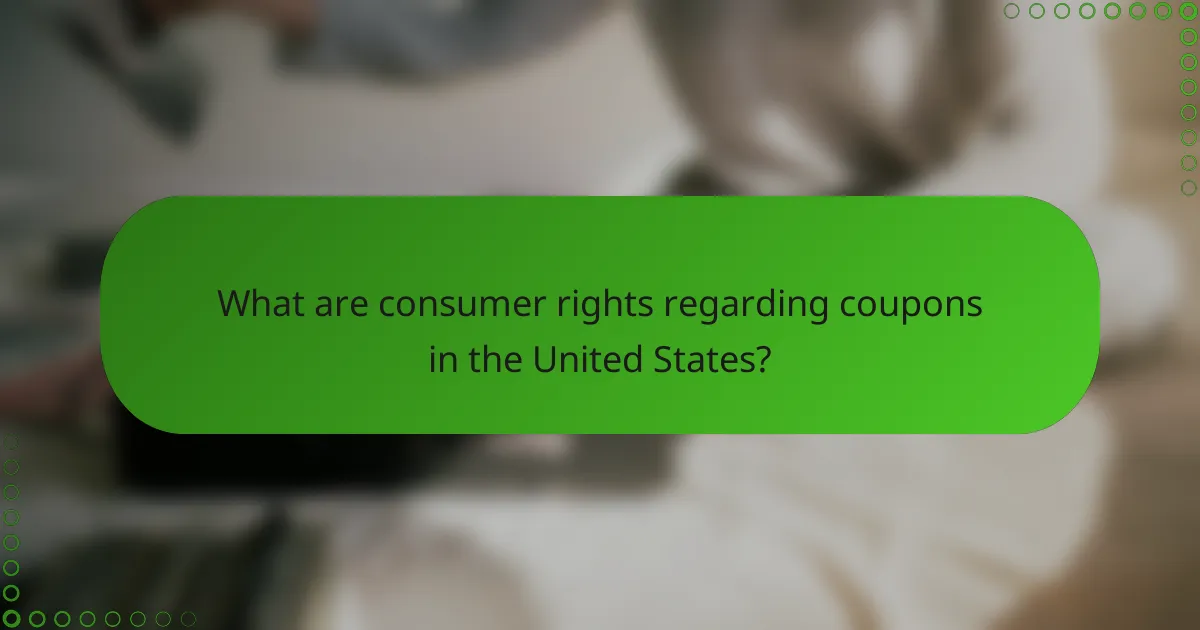
What are consumer rights regarding coupons in the United States?
In the United States, consumers have specific rights concerning the use of coupons, which include the right to accurate information, the right to redeem coupons, and protections against unfair practices. Understanding these rights can help consumers make informed decisions and avoid potential pitfalls when using coupons.
Right to accurate information
Consumers have the right to receive clear and truthful information about coupons, including their terms and conditions. This means that any restrictions, expiration dates, or limitations should be clearly stated and not misleading.
For example, if a coupon is advertised as offering a discount on a specific product, it should not be valid only for a different item without proper disclosure. Misleading information can lead to confusion and frustration for consumers.
Right to redeem coupons
Consumers have the right to redeem valid coupons as advertised by retailers. This includes the expectation that stores will honor the terms of the coupon unless it has expired or is otherwise invalid.
It is important for consumers to be aware of the redemption process, which may vary by retailer. Always check the fine print on the coupon and be prepared to present it at the time of purchase to ensure a smooth transaction.
Right to privacy
When using coupons, consumers have the right to privacy regarding their personal information. Retailers should not require unnecessary personal data in exchange for coupon use.
Consumers should be cautious about sharing information and should inquire about how their data will be used. Opting out of marketing communications can help protect privacy when signing up for coupon programs.
Right to fair treatment
Consumers are entitled to fair treatment when using coupons, which means they should not face discrimination or unfair practices based on their use of coupons. Retailers should apply coupon policies consistently to all customers.
If a consumer feels they have been treated unfairly, they can address the issue with store management or report it to consumer protection agencies for further assistance.
Right to dispute unfair practices
Consumers have the right to dispute unfair practices related to coupon use. If a retailer fails to honor a valid coupon or engages in deceptive advertising, consumers can file complaints with appropriate authorities.
Documenting the incident, including taking photos of the coupon and any relevant receipts, can strengthen a consumer’s case. Familiarizing oneself with local consumer protection laws can also provide additional avenues for recourse.
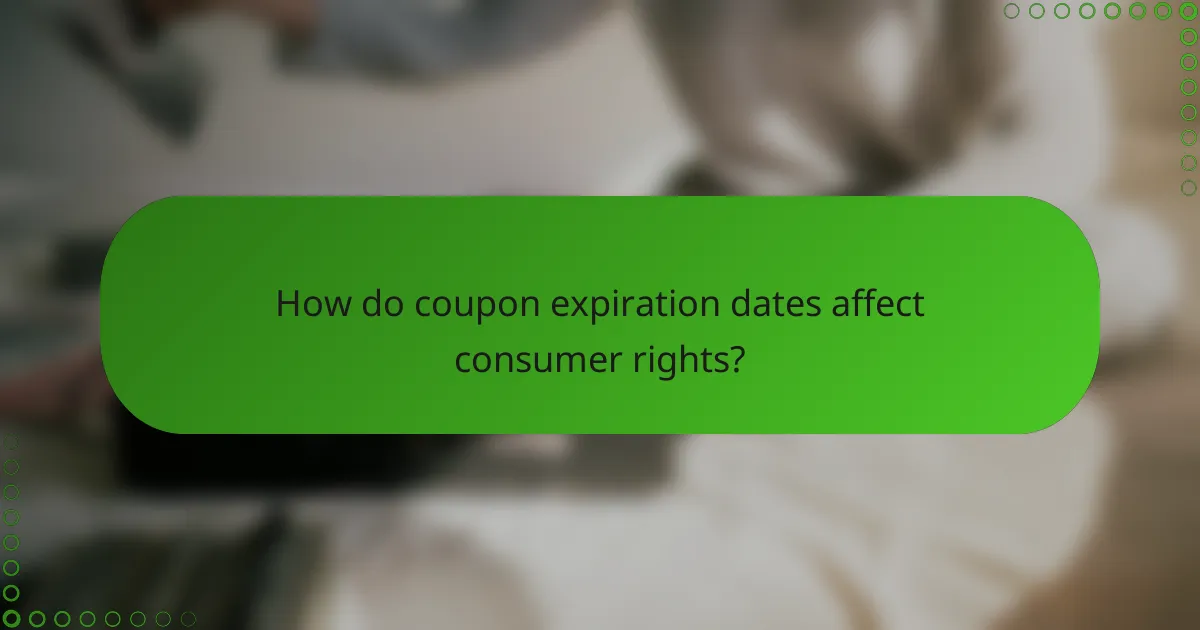
How do coupon expiration dates affect consumer rights?
Coupon expiration dates play a significant role in consumer rights by determining the timeframe within which a coupon can be redeemed. Understanding these dates helps consumers know their entitlements and the limitations imposed by retailers.
Legal standards for expiration dates
Expiration dates for coupons are generally governed by consumer protection laws, which vary by jurisdiction. In many regions, such as the European Union and the United States, there are regulations that require clear communication of expiration dates to consumers. Coupons that do not specify an expiration date may be considered valid indefinitely, depending on local laws.
Some jurisdictions may impose specific requirements on how long a coupon must remain valid, often ranging from a few months to a couple of years. Retailers must comply with these legal standards to avoid potential disputes with consumers.
Consumer notification requirements
Retailers are obligated to inform consumers about coupon expiration dates clearly and conspicuously. This means that expiration dates should be printed on the coupon in a legible manner, ensuring that consumers are aware before making a purchase. Failure to provide adequate notice can lead to consumer complaints and potential legal challenges.
In some cases, retailers may also be required to notify consumers of upcoming expiration dates through various channels, such as email or in-store signage. This proactive communication helps consumers make informed decisions regarding their coupon usage.
Impact on redemption
The expiration date of a coupon directly affects its redemption process. Once a coupon expires, it is generally considered void, and retailers are not obligated to honor it. This can lead to frustration for consumers who may have intended to use the coupon but missed the deadline.
To avoid issues, consumers should keep track of expiration dates and plan their purchases accordingly. Some retailers may offer grace periods or exceptions, but these are not guaranteed. Always check the specific terms and conditions associated with each coupon to understand its validity and redemption options.

What are the legal implications of misleading coupons?
Misleading coupons can result in significant legal repercussions for businesses, including fines and lawsuits. These implications arise when advertisements do not accurately represent the terms or value of the offer, leading to consumer deception.
Definition of misleading advertising
Misleading advertising occurs when a business presents false or deceptive information about a product or service, including coupons. This can involve exaggerating savings, omitting important conditions, or using ambiguous language that confuses consumers. The primary goal of such advertising is to mislead consumers into making purchases they might not otherwise consider.
Legal consequences for businesses
Businesses that engage in misleading advertising can face various legal consequences, including fines imposed by regulatory bodies and potential lawsuits from consumers. In many jurisdictions, such as the United States and the European Union, consumer protection laws prohibit deceptive practices and provide a framework for enforcement. Penalties can range from monetary fines to mandatory corrective advertising.
Consumer recourse options
Consumers who believe they have been misled by a coupon have several recourse options. They can file complaints with consumer protection agencies or regulatory bodies that oversee advertising practices. Additionally, consumers may seek restitution through small claims court or class-action lawsuits if they suffered financial harm due to misleading coupons.
It is advisable for consumers to keep records of the misleading advertisements and any communications with the business to support their claims. Understanding local consumer protection laws can also empower consumers to take appropriate action against deceptive practices.

How do state laws vary regarding coupon use?
State laws regarding coupon use can differ significantly, affecting how consumers can redeem discounts and how retailers manage these promotions. Some states impose specific regulations on coupon expiration dates, fraud prevention, and advertising practices, which can influence consumer rights and protections.
Overview of state-specific regulations
Each state has its own set of regulations governing coupon use, often focusing on consumer protection and fraud prevention. For instance, some states require clear disclosure of terms and conditions, while others may limit the types of discounts that can be offered. Understanding these variations is crucial for both consumers and retailers to ensure compliance and maximize benefits.
Additionally, states may enforce different rules regarding digital versus paper coupons, impacting how retailers design their promotional strategies. Consumers should be aware of their local laws to ensure they are receiving the full benefits of available discounts.
Examples from California and New York
In California, coupon regulations emphasize transparency, requiring retailers to clearly state expiration dates and any restrictions on use. This helps consumers make informed decisions and prevents misleading promotions. Retailers must also ensure that their advertising complies with state laws to avoid penalties.
New York has similar regulations but also includes specific rules about the use of digital coupons, mandating that they be easily accessible and not misleading. This focus on consumer rights ensures that shoppers can confidently utilize discounts without confusion or risk of fraud.
Impact on national retailers
National retailers must navigate the complex landscape of state laws regarding coupon use, which can lead to varied promotional strategies across different regions. These companies often standardize their coupon policies to comply with the strictest regulations, ensuring they meet legal requirements while still appealing to consumers.
This variability can create challenges in marketing and inventory management, as retailers must adapt their offerings based on local laws. Understanding state-specific regulations is essential for national brands to maintain compliance and protect their reputation while maximizing sales opportunities.

What protections exist for digital coupons?
Digital coupons are protected by various consumer rights and regulations that ensure fair use and prevent fraud. These protections include data privacy laws, fraud prevention measures, and regulations governing coupon expiration.
Consumer data protection laws
Consumer data protection laws safeguard personal information collected during digital coupon transactions. Regulations like the General Data Protection Regulation (GDPR) in Europe and the California Consumer Privacy Act (CCPA) in the U.S. require businesses to handle consumer data responsibly, providing transparency on data usage and allowing consumers to opt-out of data collection.
Businesses must implement security measures to protect sensitive information, such as encryption and secure storage. Consumers should be aware of their rights regarding data access and deletion, which can vary by jurisdiction.
Digital coupon fraud prevention
Fraud prevention measures for digital coupons include unique barcodes, QR codes, and one-time use codes to limit unauthorized access. Retailers often employ software solutions that detect suspicious activities, such as multiple redemptions from the same account.
Consumers should be cautious of offers that seem too good to be true and verify the legitimacy of coupon sources. Using coupons from reputable retailers can help minimize the risk of fraud.
Regulations on digital coupon expiration
Regulations regarding digital coupon expiration vary by region but generally require clear communication of expiration dates to consumers. In the U.S., the Federal Trade Commission (FTC) mandates that expiration dates must be disclosed prominently to avoid misleading consumers.
Consumers should check the terms and conditions associated with digital coupons, as some may have specific restrictions or shorter validity periods. Keeping track of expiration dates can help ensure that consumers maximize their savings without losing out on offers.
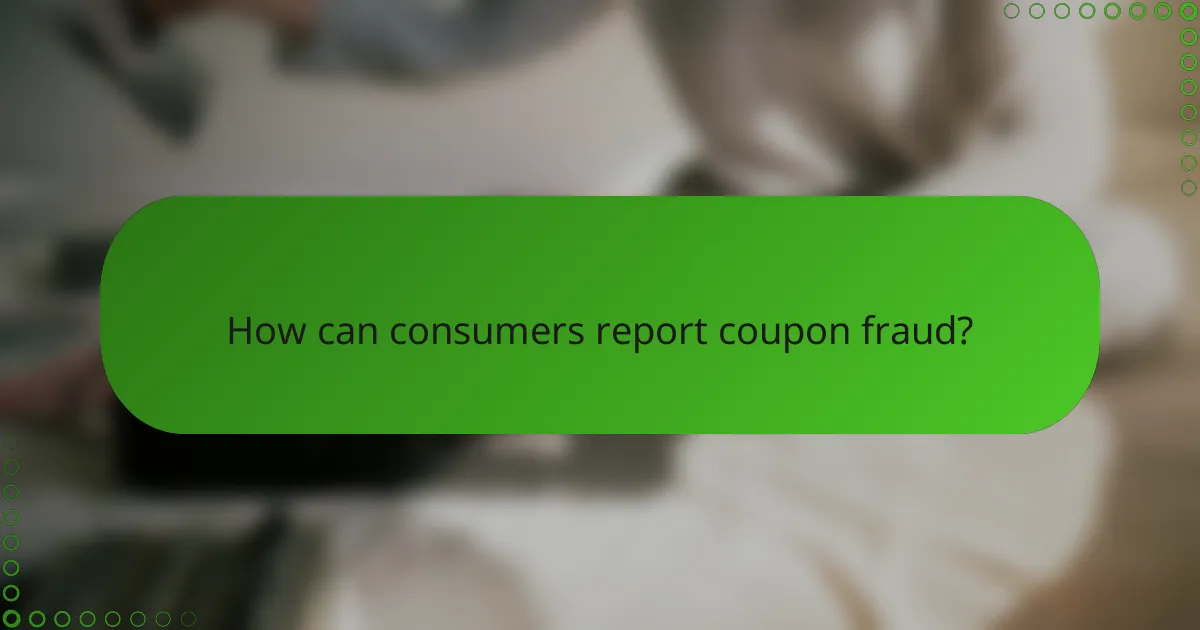
How can consumers report coupon fraud?
Consumers can report coupon fraud by contacting the appropriate authorities, such as the Federal Trade Commission (FTC) or local consumer protection agencies. Taking action helps protect others from similar fraudulent activities and ensures that violators are held accountable.
Reporting to the Federal Trade Commission
To report coupon fraud to the Federal Trade Commission, consumers can visit the FTC’s website and use their online complaint assistant. This platform allows individuals to submit detailed information about the fraudulent activity, including the nature of the fraud and any supporting documentation.
When filing a report, include specific details such as the type of coupon involved, how the fraud was discovered, and any communications with the fraudster. This information aids the FTC in investigating the issue effectively.
Consumers should be aware that while the FTC collects reports, it does not resolve individual complaints. However, these reports contribute to broader enforcement actions against fraudulent practices, which can lead to significant penalties for offenders.


